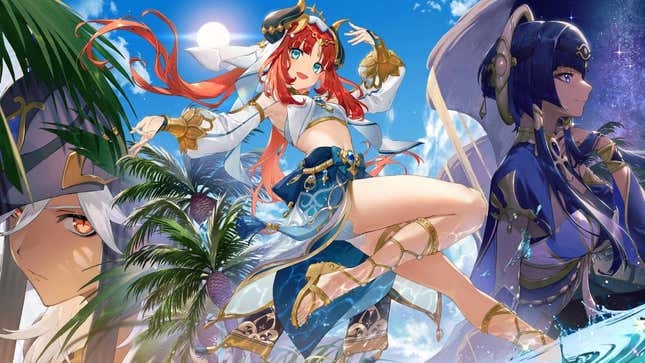
The Genshin Impact community can’t seem to stop harassing its voice actors. A few days ago, a queer Genshin voice actor made a negative tweet about “fujoshi,” a term most commonly attributed to straight women who consume anime media about gay men. The resulting firestorm of online harassment not only ensnared them and another Genshin voice actor. It also showed how perilous it is for queer people to advocate for themselves on the internet—especially as public faces of a video game with millions of players.
“Fujoshi” was first used to refer to young women who interpreted relationships between fictional men through a romantic lens. The term was originally derogatory, but became more neutral as explicitly gay works became more well-known by Japan’s general public. Even the anime industry began catering toward this population because of its high spending power. Anime news site ANN claims that the fanservice was indispensable to Shonen Jump’s success. But there’s always been a fraught tension in the anime community about whether or not reading stories about gay Japanese men is inherently fetishistic.
On January 31, Genshin voice actor Joshua David King tweeted that people who identified as “fujoshi” should “look into therapy.” A ton of anime fans were upset about the characterization of the subculture. The good reason: Many transmasculine and nonbinary people were able to come out of the closet after reading “boys love” media. Many of them were called fujoshis by transphobes who considered their gender-nonconformity to be a fetish.
King acknowledged this trajectory as a valid one and said he mainly took issue with non-queer fans turning BL works into fetish content. As a gay man who is also trans, it’s a perspective that King is perfectly entitled to. Unfortunately, Twitter has a way of flattening any possibility of nuanced discussion. Fans swarmed to his account to accuse him of misogyny and ignorance about East Asian popular culture.
King posted a Twitlonger that apologized for “casting a wide net” on who might be considered a fujoshi. But he also stood his ground on how BL gave some straight fans the leeway to fetishize gay relationships. “I am not a puritan. Queer stories come in all shapes and forms and there is not a “right way” to tell one, but it’s annoying when half of [representation] I hear about is oversexualized nonsense,” he wrote. “As much as spicy stories deserve to exist, we also deserve to have safe spaces for people not interested or not ready for that content.” He also mentioned that the blowback has been disproportionate to what he saw as a sarcastic tweet. Kotaku reached out to King for a comment but did not receive a response by the time of publication.
Another Genshin voice actor was harassed during the fujoshi controversy. Shara Kirby is the English voice actor for Candace, a playable character released late last year. Kirby tweeted in defense of King, only for Genshin fans to turn against her as well.
“This is the first time I’ve ever had so many people harass me, call me so many -isms, and seemingly call for my firing. Did not think I’d be spending the first three days of Black History Month like this!“ Kirby, who is Black, wrote in an email to Kotaku. “I don’t regret coming to my friend’s defense. They are a Black trans and queer individual who rightfully called out a section who uses an umbrella term that, while probably having good intentions, has been tainted by a sub-group who use it to get away with fetishizing BL and MLM content.” She said that she didn’t have strong opinions about fujoshi, but that she saw it was mostly non-Japanese people who were harassing King.
Even the Genshin community expressed disgust at other fans’ responses. Some pointed out that other voice actors had not received similar vitriol for controversial stances and using slurs. Others were upset that two Black voice actors were harassed on the first day of Black History Month.
Genshin was the number one most tweeted about game of last year, so their voice actors face immense public scrutiny on the platform. Kotaku reached out to Hoyoverse to ask what recourse they provide for voice actors who are targeted by online harassment but did not receive a response by the time of publication.
“At the end of the day, a lot of y’all are embarrassing and will jump an actual trans, Black, and queer person because you want to live in a fantasy world,” tweeted King. “Do better.”